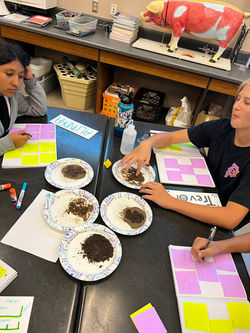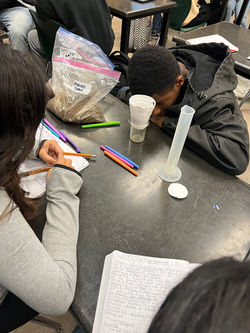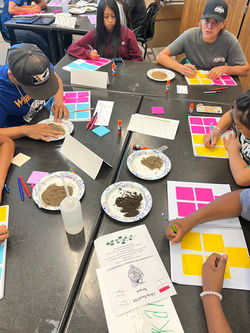
Liberty Ranch FFA

Pathways & Classes

Elements and Principles of Floral Design: Ms. Thompson & Mrs. Garner
This course meets the UC/CSU F requirement for Visual and Performing Arts. This course emphasizes the necessary knowledge and skills to provide the student with an understanding of artistic perception, creative expression, historical and cultural context(s); aesthetic valuing and connections, relations and applications of the visual arts. Students will apply the elements and principles of design to different shapes and styles of floral arrangements. Through practical skill development the student will become familiar with material selection, design mechanics, maintenance and design evaluation. Due to the cocurricular nature of FFA and SAE (Supervised Agricultural Experience) students will be required to participate in FFA activities as a graded component of the course
Advanced Art and History of Floral Design: Mrs. Garner
This course allows students to learn professional florist skills for employment in the floral field. Students will explore the floriculture industry on a more technical and advanced level including the proper care and handling of flowers, plants, and foliage; evaluate floral materials and arrangements; utilize floral tools, supplies and products to apply design principles to floral medium; construct arrangements for all occasions; display, price and market floral designs; and preserve floral materials as students run their own floral shop. The art elements and principles of design will serve as a foundation for each unit covered. After completion of this class, students will be prepared to secure a job in the floral industry. Students will be exposed to careers in Agriculture Business. Due to the co-curricular nature of FFA and SAE (Supervised Agricultural Experience) students will be required to participate in FFA activities as a graded component of the course. Prerequisite: The Elements & Principles of Floral Design.
Environmental Horticulture Science: Mrs. Garner
This hands-on course meets the CSU and UC Physical Science requirement. This course is designed to instruct students in the growth, production, and care of plants for ornamental and environmental purposes. Students will learn plant taxonomy, physiology, reproduction, growth, identification, propagation, soils, integrated pest management, landscape design, vegetable production, pomology, and floral design, Students will be introduced to careers in environmental plant science as it is one of the fastest growing sectors in the agricultural industry. Prerequisite: Elements and Principles of Floral Design and Advanced Art & History of Floral Design

Agriculture Science
Biology and Sustainable Agriculture: Ms. Foster
Hands-on laboratory course meets the CSU and UC Life Science requirement. Students will discover what molecular biology principles guide sustainable agriculture and how to maximize sustainable agricultural practices within a functioning ecosystem. Due to the co-curricular nature of FFA and SAE (Supervised Agricultural Experience) students will be required to participate in FFA activities as a graded component of the course.
Chemistry and Agriscience: Mrs. MacDonald
This hands-on course meets the CSU and UC Physical Science requirement. Students will discover the chemical nature and relationship between soil, plants, and animals and their connection to current agricultural practices. Using course knowledge, students will create a soil management plan for local community agricultural producers. Due to the co-curricular nature of FFA and SAE (Supervised Agricultural Experience) students will be required to participate in FFA activities as a graded component of the course. Prerequisite: Biology and Sustainable Agriculture
Advanced Interdisciplinary Science for Sustainable Agriculture: Ms. Thompson and Mrs. MacDonald
Students in Agriscience Systems Management will see first-hand how our state and nation’s agricultural production operates. From the production of swine to the cultivation of crops and new agricultural technology, students in this course will be involved in agricultural production through labs and engaging projects. Students will apply scientific knowledge to real life production simulations and see how the scientific concepts they have learned are involved in producing food, fiber, and bio-resources. This course will meet CSU and UC Life Science graduation requirements. Due to the co-curricular nature of FFA and SAE (Supervised Agricultural Experience) students will be required to participate in FFA activities as a graded component of the course. Prerequisite: Biology and Sustainable Agriculture and Chemistry and Agriscience

Agriculture Mechanics
Introduction to Agriculture Mechanics Skills & Technology: Mr. Van Vleck
This course designed to provide fundamental skills and competencies in vocational pathway areas related to agricultural mechanics. After thoroughly preparing students with the knowledge to work and operate safely in a mechanics environment, students gain hands-on skills in the areas of tool identification and use, electrical wiring, plumbing, woodworking, metalworking, masonry and power machine operation. This course meets graduation elective requirements. Due to the co-curricular nature of FFA and SAE (Supervised Agricultural Experience) students will be required to participate in FFA activities as a graded component of the course. This course may be repeated for credit
Agriculture Metals and Welding: Mr. Dodson
This is a one-year course for second year Agriculture Mechanic students. Students will learn basic skills in; welding safety, shielded metal arc welding, electrode selection, oxy-acetylene welding and oxy-fuel cutting. Due to the co-curricular nature of FFA and SAE (Supervised Agricultural Experience) students will be required to participate in FFA activities as a graded component of the course. Prerequisite: Introduction to Agriculture Mechanics Skills and Technology or teacher recommendation
Agricultural Welding and Fabrication: Mr. Dodson
This course is designed to prepare students for entry-level employment in the field of agriculture mechanics, welding, and fabrication. Students will be instructed in safety and metal fabrication. Students will learn specialized welding skills and practices including the nature and identification of metals, concentration on out-of-position Shielded Metal Arc Welding (SMAW, GMAW (MIG) with micro and core wire, GTAW (TIG) of non-ferrous metals (aluminum & stainless steel), cast iron welding, hard surfacing, plasma arc cutting, and freehand and automatic shape burning. Due to the co-curricular nature of FFA and SAE (Supervised Agricultural Experience) students will be required to participate in FFA activities as a graded component of the course. Prerequisites: Agriculture Metals and Welding or teacher recommendation.
Agriculture Construction BITA 1: Mr. Van Vleck
This course focuses on fine woodworking projects using woodworking specific tools such as the table saw, miter saw, jointer, planer, routers, drill press, bandsaw and a variety of sanders. This course will also include safety procedures, wood selection, types of cuts, and knowledge on the forestry industry. Prerequisite: Introduction to Agriculture Mechanics Skills and Technology.

Other Classes
Though our pathway classes are our most commonly taken classes, we also have other classes:
American Government - AG: Ms. Thompson
This is a college preparatory course for students interested in pursuing agricultural studies in college, with emphasis on the application of democratic, civic and economic principles to agricultural practices including units on marketing, agriculture law, credit and finance, government programs, responsibilities of citizenship, the Constitution and the Bill of Rights, the courts, the Legislative and Executive Branches, and State and Local Government. Due to the cocurricular nature of FFA and SAE (Supervised Agricultural Experience) students will be required to participate in both FFA activities and SAE involvement, both of which are graded components of the course. Prerequisite: Economics in Agriculture must be taken concurrently.
Economics in Agriculture: Ms. Thompson
In economics, students will examine the foundation of our economic system. This class is designed to give students the big picture of economic principles, while preparing them for living in a world in which they work, buy, sell, and actively participate as citizens who make choices. This class will stress critical thinking and problem solving skills students need for making economic decisions that will affect them for the rest of their lives. The following economic areas will be emphasized: economic systems, price determination, market structures, investment and credit, types of business organizations and labor, economic data and problems, taxes, monetary and fiscal policy, and international trade. Prerequisite: American Government - AG must be taken concurrently.
Food Science/Farm to Fork: Mrs. Garner
This course is designed to allow students to apply plant science concepts as they learn to grow their own food in their garden plot. Students will practice various processing, packaging, and food preparation techniques to ultimately eat local, healthy, fresh food. This class will teach students about nutrition, farming, and cooking allowing students to experience first-hand the process from Farm to Fork.
Leadership in Agriculture: Ms. Foster
This course is designed to engage students in experiential activities which further their personal development and premier leadership skills. The curriculum consists of integrated performance activities that will assist in the development of critical thinking, extemporaneous speaking, conflict resolution, consensus-building and group communication abilities. Written and oral skill development will be emphasized through individual and collaborative projects. Due to the co-curricular nature of FFA and SAE (Supervised Agricultural Experience) students will be required to participate in both FFA activities and SAE involvement, both of which are graded components of the course.
 |  |  |
|---|---|---|
 |  |